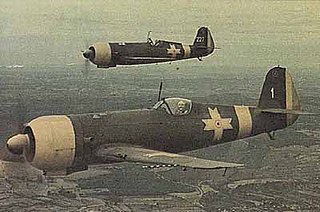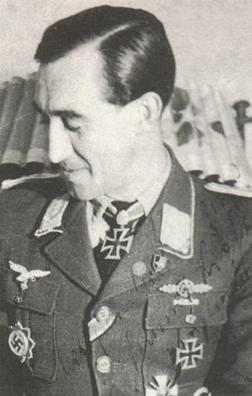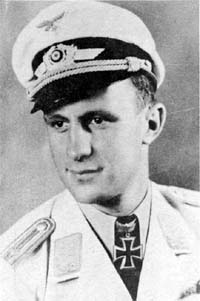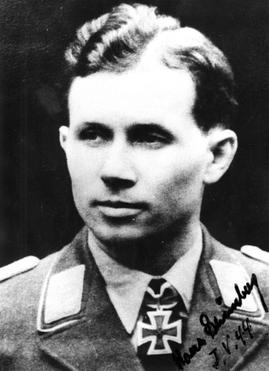| Romanian Air Force |
|---|
  |
| History |
| Aircraft |
| Structure |
| Personnel |
This is a list of fighter aces in World War II of the Royal Romanian Air Force. For other countries see List of World War II aces by country.
| Romanian Air Force |
|---|
  |
| History |
| Aircraft |
| Structure |
| Personnel |
This is a list of fighter aces in World War II of the Royal Romanian Air Force. For other countries see List of World War II aces by country.
In February 1944, the ARR (Aeronautica Regală Română) implemented a new and unique scoring system for victories. Victory points were awarded for confirmed and unconfirmed victories as well as for aircraft destroyed on the ground. Points were also awarded for shared victories. This system was applied to all claims prior to its introduction date and followed these rules: [1]
The following list contains all pilots who scored 5 victories by the 1944 standard, also mentioning their number of aircraft shot down including shares and unconfirmed victories: [2] [a]
| Name | Victories | ARR victories | Notes |
|---|---|---|---|
| Constantin "Bâzu" Cantacuzino | 53 + 1* | 69 | Top scoring Romanian ace 11 unconfirmed |
| Alexandru Șerbănescu | 52 | 55 | Top scoring Romanian ace before Romania left the Axis 8 unconfirmed |
| Ion Milu | 37 + 1* | 52 | 4 unconfirmed |
| Dan Vizanty | 15 + 1* | 43 | |
| Constantin Rosariu | 20 | 33 | 2 unconfirmed |
| Cristea Chirvăsuță | 22 | 31 | 4 unconfirmed |
| Ioan Maga | 20 | 29 | 5 unconfirmed |
| Ion Mucenica | 23 + 1* | 27 | 2 unconfirmed |
| Vasile Gavriliu | 20 + 1* | 27 | 2 unconfirmed |
| Tudor Greceanu | 24 | 24 | 5 unconfirmed |
| Constantin Lungulescu | 19 + 1* | 24 | 2 unconfirmed |
| Ioan Dicezare | 19 | 23+ | 3 unconfirmed |
| Dumitru Ilie | 14 | 22 | 3 unconfirmed |
| Ioan Mălăcescu | 19 | 21 | 3 unconfirmed |
| Gheorghe Popescu-Ciocănel | 14 | 19 | 1 unconfirmed |
| Dan Scurtu | 14 | 19 | 3 unconfirmed |
| Teodor Zăbavă | 17 + 1* | 18 | 3 unconfirmed |
| Andrei Rădulescu | 14 | 18 | 4 unconfirmed |
| Tiberiu Vinca | 16 + 1* | 17 | 3 unconfirmed |
| Traian Dârjan | 11 + 1* | 17 | 1 unconfirmed |
| Mihai Bulat | 4 + 5* | 17 | |
| Ioan Nicola | 6 + 4* | 16 | |
| Ion Dobran | 13 | 15 | 3 unconfirmed |
| Mihai Mihordea | 9 + 1* | 15 | 1 unconfirmed |
| Ștefan Dumitrescu | 8 | 15 | 2 unconfirmed |
| Aurel Tifrea | 6 | 15 | 1 unconfirmed |
| Gheorghe Stănică | 5 | 15 | 2 unconfirmed |
| Eugen Fulga | 3 + 7* | 15 | 1 unconfirmed |
| Ernst Stengl | 12 | 14 | Luftwaffe liaison officer Also served with German units; destroyed 17 aircraft in total |
| Eugen Camencianu | 10 | 14 | 3 unconfirmed |
| Costică P. Popescu | 8 | 14 | 1 unconfirmed |
| Petre Cojocaru | 4 + 1* | 14 | 1 unconfirmed |
| Dumitru Chera | 4 + 1* | 13 | |
| Iosif Moraru | 12 | 13 | 4 unconfirmed |
| Ioan Micu | 11 + 1* | 13 | 1 unconfirmed |
| Mircea Dumitrescu | 7 + 3* | 13 | 2 unconfirmed |
| Horia Agarici | 8 | 13 | 2 unconfirmed |
| Lucian Toma | 7 | 13 | |
| Hariton Dușescu | 11 | 12 | 1 unconfirmed |
| Gheorghe Țuțuianu | 10 | 12 | 2 unconfirmed |
| Ion Galea | 7 | 12 | 2 unconfirmed |
| Gheorghe Cristea | 3 + 1* | 12 | |
| Ioan Bârlădeanu | 3 + 1* | 12 | 1 unconfirmed |
| Nicolae Polizu-Micșunești | 10 | 11 | |
| Ștefan Greceanu | 10 | 11 | 3 unconfirmed |
| Ioan Panaite | 9 | 11 | 1 unconfirmed |
| Constantin Ursache | 9 | 11 | 1 unconfirmed |
| Florian Alexiu | 8 | 11 | 1 unconfirmed |
| Christu I. Christu | 4 + 4* | 11 | |
| Ștefan Octavian Ciutac | 6 | 11 | |
| Nicolae Macri | 5 | 11 | |
| Ioan Ivancievici | 4 + 3* | 11 | 2 unconfirmed |
| Nicolae Burileanu | 10 | 10 | 1 unconfirmed |
| Liviu Mureșan | 9 | 10 | 2 unconfirmed |
| Laurențiu Cătană | 8 | 10 | |
| Emil Bălan | 7 | 10 | 2 unconfirmed |
| Ioan Dimache | 6 + 1* | 10 | |
| Mircea Mazilu | 5 + 2* | 10 | 3 unconfirmed |
| Constantin Dimache | 4 + 3* | 10 | |
| Dumitru Baciu | 5 + 1* | 10 | 2 unconfirmed |
| Gheorghe Hăpăianu | 9 | 9 | 2 unconfirmed |
| Florian Budu | 9 | 9 | |
| Parsifal Ștefănescu | 9 | ||
| Petre Cordescu | 6 | 9 | |
| Alexandru Moldoveanu | 6 | 9 | 2 unconfirmed |
| Mircea Șenchea | 6 | 9 | 3 unconfirmed |
| Gheorghe Parsinopol | 3 | 9 | 1 unconfirmed |
| Constantin Baltă | 3 | 9 | 1 unconfirmed |
| Constantin Georgescu | 3 | 9 | 1 unconfirmed |
| Petre Mihăilescu | 3 | 9 | 1 unconfirmed |
| Gheorghe Mociorniță | 3 | 9 | 1 unconfirmed |
| Jean Sandru | 3 | 9 | 1 unconfirmed |
| Ioan Sandu | 3 | 9 | 1 unconfirmed |
| Panait Grigore | 3 | 9 | 2 unconfirmed |
| Constantin Nicoară | 7 | 8 | 2 unconfirmed |
| Gheorghe Cocebaș | 6 | 8 | |
| Emil Georgescu | 5 | 8 | 1 unconfirmed |
| Ștefan Pucas | 5 | 8 | 1 unconfirmed |
| Ioan Marinciu | 4 | 8 | |
| Gheorghe Alexandru Grecu | 3 + 1* | 8 | 1 unconfirmed |
| Carol Anastasescu | 3 | 8 | 1 unconfirmed |
| Vasile Forțu | 7 | 7 | 2 unconfirmed |
| Ioan Florea | 5 | 7 | |
| Constantin Pomuț | 5 | 7 | 1 unconfirmed |
| Vasile Mirilă | 4 | 7 | |
| Aurel Vlădăreanu | 3 | 7 | |
| Titus Gheorghe Ionescu | 3 | 7 | 1 unconfirmed |
| Erich Richard Selei | 6 | 6 | 1 unconfirmed |
| Ioan Vornica | 6 | 6 | |
| Radu Reinek | 5 + 1* | 6 | |
| Constantin P. Popescu | 5 | 6 | |
| Iuliu Anca | 5 | 6 | 1 unconfirmed |
| Pavel Țurcanu | 5 | 6 | |
| Nicolae Naghirneac | 4 | 6 | 2 unconfirmed |
| Iosif Ciuhulescu | 2 + 3* | 6 | 1 unconfirmed |
| Dumitru Niculescu | 2 + 3* | 6 | |
| Ștefan Florescu | 3 | 6 | |
| Eugen Taflan | 3 | 6 | 1 unconfirmed |
| Virgil Anghelescu | 2 | 6 | |
| Pavel Bucșa | 2 | 6 | |
| Vasile Ioniță | 2 | 6 | 1 unconfirmed |
| Mircea Teodorescu | 2 | 6 | 1 unconfirmed |
| Gheorghe Gulan | 1 + 1* | 6 | |
| Petre Scurtu | 2* | 6 | |
| Vintilă V. Brătianu | 5 | 5 | |
| Mihai Belcin | 4 + 1* | 5 | |
| Florea Iordache | 5 | 5 | 1 unconfirmed |
| Ioan Mihăilescu | 5 | 5 | 1 unconfirmed |
| Emil Droc | 5 | 5 | 2 unconfirmed |
| Costin Miron | 5 | 5 | 2 unconfirmed |
| Romeo Neacșu | 5 | 5 | 2 unconfirmed |
| Ioan Bocșan | 5 | 5 | |
| Marin Ghica | 5 | 5 | |
| Ioan Simionescu | 4 | 5 | |
| Alexandru Economu | 4 | 5 | 1 unconfirmed |
| Nicolae Sculy Logotheti | 4 | 5 | 1 unconfirmed |
| Nicolae Iolu | 4 | 5 | |
| Gheorghe Pisoschi | 3 + 1* | 5 | 1 unconfirmed |
| Dumitru Encioiu | 3 | 5 | |
| Ioan Roșescu | 3 | 5 | |
| Nicolae Bătrânu | 3 | 5 | 1 unconfirmed |
| Vasile Pascu | 2 + 1* | 5 | 1 unconfirmed |
| Clemente Mureșan | 2 | 5 | |
| Petre Constantinescu | 2 | 5 | 1 unconfirmed |
| Alexandru Manoliu | 5 | 5 |

The IAR 80 was a Romanian World War II low-wing monoplane, all-metal monocoque fighter and ground-attack aircraft. When it first flew, in 1939, it was comparable to contemporary designs being deployed by the airforces of the most advanced military powers such as the Hawker Hurricane and Bf 109E. Production problems and lack of available armament delayed entry of the IAR 80 into service until 1941. It remained in frontline use until May 1945.

The Messerschmitt Bf 109 is a German World War II fighter aircraft that was, along with the Focke-Wulf Fw 190, the backbone of the Luftwaffe's fighter force. The Bf 109 first saw operational service in 1937 during the Spanish Civil War. It was still in service at the end of World War II in 1945. It was one of the most advanced fighters when it first appeared, with an all-metal monocoque construction, a closed canopy, and retractable landing gear. A liquid-cooled, inverted-V12 aero engine powered it. It was called the Me 109 by Allied aircrew and some German aces, even though this was not the official German designation.

A flying ace, fighter ace or air ace is a military aviator credited with shooting down five or more enemy aircraft during aerial combat. The exact number of aerial victories required to officially qualify as an ace is varied but is usually considered to be five or more.
Fighter aces in World War II had tremendously varying kill scores, affected as they were by many factors: the pilot's skill level, the performance of the airplane the pilot flew and the planes they flew against, how long they served, their opportunity to meet the enemy in the air, whether they were the formation's leader or a wingman, the standards their air service brought to the awarding of victory credits, et cetera.

Eino Ilmari "Illu" Juutilainen was a fighter pilot of the Ilmavoimat, and the top scoring non-German fighter pilot of all time. The top flying ace of the Finnish Air Force, he led all Finnish pilots in score against Soviet aircraft in World War II, with 94 confirmed aerial combat victories in 437 sorties. He achieved 58 of his victories while flying a Messerschmitt Bf 109G and 34 with a Brewster Buffalo.

Prince Constantin Cantacuzino was a Romanian aviator, the leading World War II fighter ace of his country, as well as a member of the Cantacuzino family.

Alexandru "Alecu" Șerbănescu was a leading Romanian fighter pilot and flying ace in World War II. At the end of Romania's campaign on the side of the Axis, Șerbănescu was the country's leading ace, dying only 5 days before the country changed sides. He was credited with 47 aircraft confirmed destroyed and 8 probables.

Kurt Welter was a German Luftwaffe fighter ace and the most successful Jet Expert of World War II. A flying ace or fighter ace is a military aviator credited with shooting down five or more enemy aircraft during aerial combat. He claimed a total of 63 aerial victories—that is, 63 aerial combat encounters resulting in the destruction of the enemy aircraft—achieved in 93 combat missions. He recorded 56 victories at night, including 33 Mosquitos, and scored more aerial victories from a jet fighter aircraft than anyone else in World War II and possibly in aviation history. However this score is a matter of controversy; research of Royal Air Force losses suggests Welter overclaimed Mosquito victories considerably. Against this, Luftwaffe claims were very strict, requiring confirmation and proof by witnesses: The remains of aircraft shot down and crashed would be verifiable and recorded on the ground in the sector claimed.

The Air Force branch of the Royal Romanian forces in World War II was officially named the Aeronautica Regală Română, though it is more commonly referred to in English histories as the Forțele Aeriene Regale ale României, or simply Forțele Aeriene Române. It provided support to land forces, carrying out reconnaissance and mounting air raids between other missions.

Helmut Lipfert was a German Luftwaffe military aviator during World War II. Lipfert ranks as the world's thirteenth fighter ace. Lipfert was credited with 203 victories achieved in 687 combat missions. All his victories were claimed over the Eastern Front and included a P-51 Mustang, 41 Yakovlev Yak-1, 41 Yakovlev Yak-9 fighters, two four-engine bombers and 39 Ilyushin Il-2 ground-attack aircraft. He was shot down fifteen times, without being injured.

Hans-Heinz Augenstein was a German Luftwaffe military aviator and flying ace during World War II. A flying ace or fighter ace is a military aviator credited with shooting down five or more enemy aircraft during aerial combat. Operating as a night fighter pilot, he was credited with 46 aerial victories, of which 45 were four-engine bombers, all of which claimed in Defense of the Reich.

Hans "Specker" Grünberg was a German military aviator who served in the Luftwaffe during World War II. As a fighter ace, he was credited with 82, aerial victories—that is, 82 aerial combat encounters resulting in the destruction of the enemy aircraft—claimed in approximately 550 combat missions. The majority of his victories were claimed over the Eastern Front, with 21 claims over the Western Front, including five flying the Messerschmitt Me 262 jet fighter.

Peter "Bonifazius" Düttmann was a German Luftwaffe military aviator and fighter ace during World War II. He is credited with 152 aerial victories achieved in 398 combat missions, all of which claimed on the Eastern Front.
Herbert Rollwage was a German Luftwaffe military aviator and fighter ace during World War II. Depending on source, he is credited between 71 and 102 aerial victories achieved in 664 combat missions. This figure includes 11 aerial victories on the Eastern Front, and at least 61 victories over the Western Allies, including up to 44 four-engine heavy bombers.
Helmut Bergmann was a German Luftwaffe military aviator during World War II, a night fighter ace credited with 36 enemy aircraft shot down in 135 combat missions. All of his victories were claimed over the Western Front in nocturnal Defense of the Reich missions against the Royal Air Force's Bomber Command.
Leopold "Poldi" Fellerer was a Luftwaffe night fighter ace and recipient of the Knight's Cross of the Iron Cross during World War II. The Knight's Cross of the Iron Cross was awarded to recognise extreme battlefield bravery or successful military leadership.

During World War I, the national air services involved developed their own methods of assessing and assigning credit for aerial victories. For various reasons, all belligerents engaged in overclaiming aerial victories to a greater or lesser degree. The accuracy of reported aerial victories varied widely according to definitions and terminology, how strict the standards of verification were defined and upheld, and how well they were able to control for all sorts of cognitive biases in assessing the evidence of aerial victory claims.
Franz Schwaiger was a Luftwaffe ace and recipient of the Knight's Cross of the Iron Cross during World War II. The Knight's Cross of the Iron Cross was awarded to recognise extreme battlefield bravery or successful military leadership - for the fighter pilots, it was a quantifiable measure of skill and success.